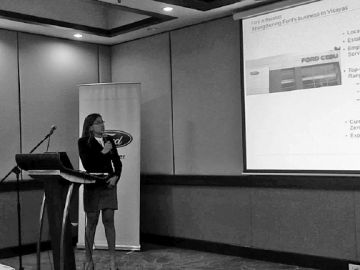Proposed excise tax on vehicles seen to drive 2017 car sales

Ivy Castro, Ford Cebu general sales manager, talks about their company’s operations here during a press conference at the Cebu City Marriott Hotel on September 20.
CDN PHOTO/Victor Anthony V. Silva
Anyone who plans to buy a car should do so now while the excise tax on motor vehicles being pushed by the Duterte administration has not been imposed yet.
Ivy Castro, general sales manager of Ford Philippines Cebu, said they were looking at the impending implementation of the tax measure as one of the drivers of car sales in Cebu this year.
“That’s also the reason our numbers are going high. If they have plans of buying, they will buy because it will be happening very soon,” she told reporters during a press conference for the Ford Island Conquest on Wednesday.
The Duterte administration’s first comprehensive tax reform package (CTRP) includes a proposed hike on the excise tax slapped on cars. The package’s version in the House of Representatives, filed as House Bill 5636, or the Tax Reform for Acceleration and Inclusion (TRAIN) bill, was passed in May.
The CTRP, which the proponents hope to implement by 2018, seeks to impose a three to four percent excise tax staggered over a two-year period, from the current two percent, on motor vehicles priced above P600,000. As proposed, a three percent excise tax on cars will be imposed starting January 1, 2018 and four percent by January 1, 2019.
The government wanted to increase the automotive excise tax as one of several measures to offset revenue losses from the lowering of personal income tax under the CTRP. If approved by Congress and implemented next year, the government will lose P141.4 billion from lower personal income taxes on top of foregone revenues of P3.1 billion from the reduction in estate and donor’s taxes.
However, the expansion of the value-added tax base under HB 5636 will generate P81 billion in fresh revenues. The higher excise taxes to be slapped on oil products and vehicles, meanwhile, will add an additional P73.7 billion and P14.1 billion, respectively. The P10-per-liter excise tax on sugar-sweetened drinks will generate P47 billion.
Projected slow down in 2018
Castro admitted that they expect car sales to slow down once the tax reforms are implemented, but was optimistic it will pick up again after a few months.
“People will still observe what is really going on. But I believe (sales) will go up again because cars are a necessity nowadays,” she said.
Cebu City has become one of Ford’s biggest markets in the Visayas, growing close to three times in 2015 in terms of sales from 2014.
Castro said they used to sell only 50 units on average every month three years ago, but grew to 140 units monthly in 2015 after they introduced the EcoSport to the public.
For the first eight months of 2017, Ford Philippines Cebu has sold more than 1,000 units, with the Ranger being the best seller, followed by the Everest.
Sales reflected a 10-percent growth from figures in the same period in 2016.
She said cars have also become more affordable due to banks offering low down payment schemes and zero interest on payments.
“But our sales picked up mostly because of the units. They just have wonderful features,” said Castro.
The Ford Island Conquest, happening at SM City Cebu on Sep. 22 to 24, is a roadshow meant to reach out to more customers here.
During the roadshow, customers will be able to test drive Ford’s best-selling vehicles like the Everest mid-size SUV, EcoSport compact SUV and the segment-defining Ranger pickup.
The Everest is for big families and entrepreneurs; the Ranger is for those who are into construction and real estate businesses; while the EcoSport appeals mostly to young professionals, women, and those with smaller families.
Ford Cebu started operations in 1999 and is currently home to 146 employees in sales, service and finance departments.
The company has dealerships in Lahug, Cebu City, as well as in Minglanilla in southern Cebu, and is planning to expand most likely in the northern part of Cebu by the second quarter of 2018, reinforcing the growing demand for cars in the province.
As a whole, car sales nationwide grew only by 8.7 percent in August, the slowest in four months, data from automotive and truck manufacturers showed.
According to a joint report of the Chamber of Automotive Manufacturers of the Philippines Inc. (Campi) and the Truck Manufacturers Association (TMA), member companies sold 35,309 units in August, an 8.7 percent increase from the 32,472 cars sold in the same month in 2016.
The growth is the slowest since April this year, during which time Campi and TMA reported a year-on-year growth of only 4.8 percent.
In the first eight months of the year, car sales grew 16.7 percent to 268,424 units from 229,919 units sold in the same period in 2016.
Disclaimer: The comments uploaded on this site do not necessarily represent or reflect the views of management and owner of Cebudailynews. We reserve the right to exclude comments that we deem to be inconsistent with our editorial standards.




